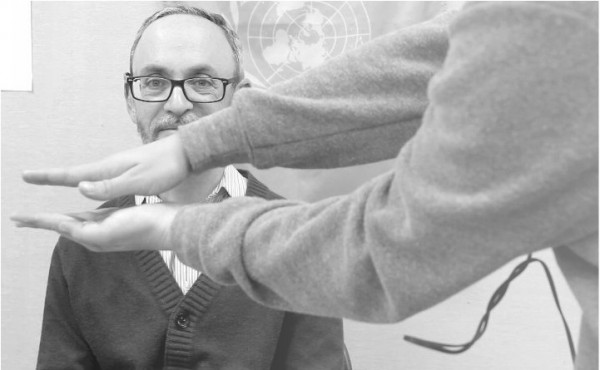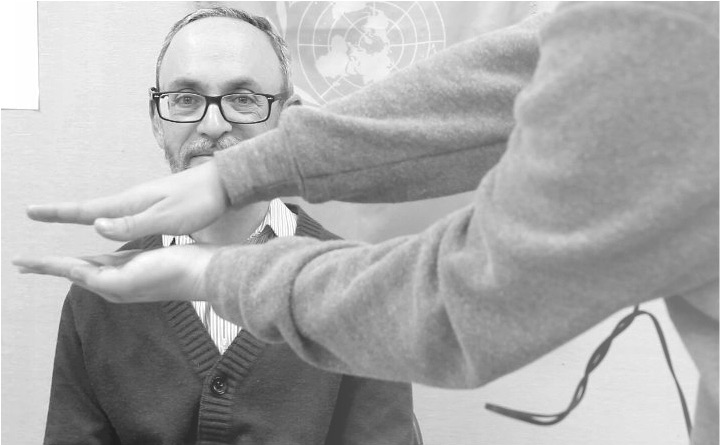
With over two hundred thousand students enrolled at more than 800 institutions, Jewish day schools are becoming more and more prevalent in the American Jewish community.
That’s two hundred thousand students learning about Israel from an early age — but what are these students actually learning about Israel? That’s what “Between The Lines,” a documentary about Israel education in Jewish day schools, seeks to answer.
“I went to a Jewish day school my whole life,” said Ali Kriegsman, the film’s co-producer and story coordinator. “I was taught about Israel in a certain way.”
Kriegsman worked with Jana Kozlowski, an associate producer of HBO’s Emmy-winning documentary series “Vice,” to create “Between The Lines.”
“Israel was always at the epicenter of Jewish culture,” said Kriegsman, who graduated from the University of Pennsylvania in 2013.
“[In college], I realized a lot of information was left out of my schooling. I didn’t realize why the conversations on campus were so different.”
Kriegsman said she felt that her Israel education in elementary, middle, and high school left her unprepared for conversations later on.
“I was going into these conversations blind [in college],” she said. “I just looked silly and uninformed.”
For the documentary, Kriegsman and Kozlowski interviewed 35 people, all associated with a Jewish day school as an alumnus, current student, or employee.
“I reached out to people myself, [and] we were really connected to Berkeley and other schools,” Kriegsman said. “It was a mix of networking and my own contacts … Through networking, people heard I was doing the project.”
The film shows how students’ education from a young age about Israel is shaped by their educators’ points of view.
“I started learning about the war pretty young, the importance for us to have a homeland,” says Jewish day school graduate Tamar Karpuj in the film.
Many of the students interviewed for the film said they felt their Israel education was very one-sided.
“When they encounter other students who actually know much more … the Jewish students who come out thinking they’re prepared are embarrassed,” Ian Lustick, the Bess W. Heyman Chair Professor at the University of Pennsylvania, says in the film.
“People come into the classroom with not only pre-established ideas, but pre-established emotions,” Jewish day school student Mikaela Gerwin says in the film.
Several students with views differing from their educators were also often made to feel as though they could not have their opinion.
“Students who might want to offer a critical perspective are generally not made to feel 100 percent welcome,” says Rabbi Andy Bachman, formerly of Congregation Beth Elohim, in the film. Bachman now works at the 92nd Street Y.
Kriegsman’s hope is that “Between The Lines” will spark a conversation among Jewish day school educators — and many of the teachers she spoke to for the film were beginning to reform their lessons.
“A lot of the educators were in the middle of changing their Israel curriculums,” she said.
For many educators at day schools, the goal is to balance their personal views on Israel with the country’s history.
“They’re only 8th graders,” Susan Siegel, head of B’nai Shalom Day School, told New Voices about her students. “We don’t focus on politics, we just focus on the history and Zionism. There’s nothing political about it.”
“Our goal is to really connect the [Zionistic] approach and to create that feeling of Zionism in them,” Siegel added.
Though Kriegsman said she and Kozlowski got a lot of flack for allegedly showing only people who agreed that Israel needed to be taught in a less biased way, Kriegsman said everyone she interviewed felt the same way about their education.
“No one sat there and said their Jewish education was consistent,” she said. “Even people who believe [in] an advocacy component [concerning Israel] believe there’s something that needs to change.”
Watch a preview below, or view the documentary on YouTube.
Nicole Zelniker is a student at Guilford College.

